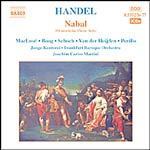
Handel: Nabal (compiled from various works by John Christopher Smith (1712-95))
 $28.00
Out of Stock
$28.00
Out of Stock6+ weeks add to cart
GEORG FRIDERIC HANDEL
Handel: Nabal (compiled from various works by John Christopher Smith (1712-95))
Stephan MacLeod / Maya Boog / Knut Schoch / Frankfurt Baroque Orchestra / Martin
[ Naxos / 2 CD ]
Release Date: Tuesday 10 September 2002
This item is currently out of stock. It may take 6 or more weeks to obtain from when you place your order as this is a specialist product.
This oratorio was performed at Covent Garden in London 1764
"This is a tidily stylish performance by the choir, Junge Kantorei, the Frankfurt Baroque Orchestra and a strong team of aptly supple, light-voiced soloists."
- Stephen Pettitt, The Sunday Times, July 14, 2002
Georg Friedrich Händel, later more generally known under the English forms of name that he assumed in London, George Frideric Handel, was born in Halle in 1685, the son of a successful barber-surgeon and his much younger, second wife. His father opposed his son's early musical ambitions and after his father's death Handel duly entered the University in Halle in 1702 as a student of law, as his father had insisted. He was able to seize the chance of employment as organist at the Calvinist Cathedral the following month, holding the position for a year, until his departure for Hamburg, to work there at the opera, at first as a violinist and then as harpsichordist and composer, contributing in the latter capacity to the Italian operatic repertoire of the house. At the invitation of the son of the Medici Grand Duke of Tuscany, he travelled, in 1706, to Italy, where he won considerable success during the next four years. Connections he had made in Venice, brought appointment in 1710 as Kapellmeister to the Elector of Hanover. From here he was granted immediate leave to fulfil a commission in London.
Handel's first opera for London was Rinaldo, with which he won general acclaim, and after little over a year in Hanover, he returned to England. It was here that he now established himself as a composer of Italian opera and of other forms of vocal and instrumental music, for which there was an eager audience, gradually achieving a dominant position in the musical life of the English capital. His involvement with Italian opera as a composer and organizer continued, eventually under the royal patronage of George I, Elector of Hanover, who had succeeded to the English throne in 1715, on the death of Queen Anne, but by 1733, with the establishment of a rival opera company under the patronage of the Prince of Wales, there were obvious commercial difficulties.
While Handel's work in Italian opera continued, with a final opera to be staged in 1741, he increasingly turned his attention to a new English form, that of the oratorio. This had certain very practical advantages, in language, lack of the need for expensive spectacle and the increasing employment of native singers. The content of oratorios appealed to English Protestant susceptibilities, providing a winning synthesis of religion and entertainment, and offering no offence to those who had found operatic conventions ridiculous in a city with strong pre-existent dramatic traditions. Handel's first English oratorio, in 1732, was Esther, with a libretto based on Racine, followed, in 1733, by the biblical Deborah in March and in July Athalia, with a libretto by Samuel Humphreys, his earlier collaborator, derived from Racine and biblical sources. The next English oratorio relying on biblical sources was Saul, first performed at the King's Theatre in London on 16th January 1739 and revived on a number of subsequent occasions.
During the following years Handel continued to develop the form of the oratorio, chiefly on biblical subjects but with an occasional excursion into the mythological. These works, with their Italianate melodies, strong choral writing and demonstrable dramatic sense, ensured their composer's continued popularity and dominance, particularly, after his death, with the wider development of choral singing in the nineteenth century. Handel's most famous oratorio, Messiah, was first performed in 1742, his last, Jephtha, ten years later. While Messiah may be exceptional in its ambitious subject, most of his oratorios treat narratives derived from the Old Testament, well characterized by the composer's own descriptive title of them as sacred dramas.
Handel died in London in April 1759 and was buried, as he had requested, in Westminster Abbey, to be commemorated there three years later by an imaginative and slightly improbable monument by Louis François Roubiliac, who had provided, thirty years before, a statue of the composer, in his night-cap and slippers, as Apollo, for the pleasure gardens at Vauxhall, an indication of his popular reputation. His funeral drew a crowd of some three thousand mourners, while posthumous Handel celebrations could muster a similar audience in the Abbey, with a proportionate number of performers.